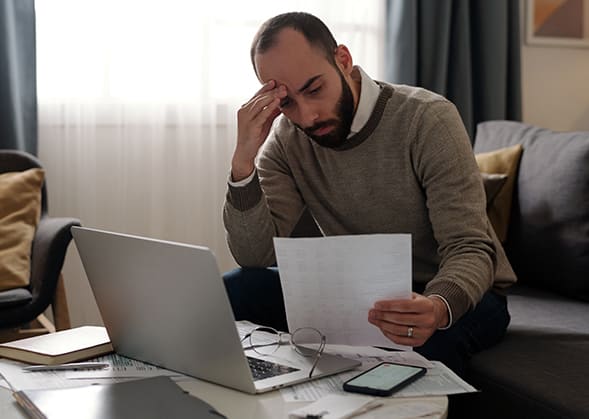Your Self Assessment tax return accountant at your service
As you know, in the UK, every individual is responsible for paying the right amount of tax to HMRC. This is done by completing a Self Assessment or personal tax return and is a legal obligation.
Life’s too short for you to worry about it. Let Lyel Accountants minimise that stress and prepare your tax returns instead!


WE ARE THE EXPERTS
Self Assessment tax return services that deliver
Your online Self Assessment tax return deadline is January 31, and preparing all the necessary documents on your own can be confusing if you aren’t used to it.
Plus, HMRC penalties for delaying your Self Assessment tax filing start right after the deadline, so you’ll definitely want to submit everything in advance!
Whether you’re self-employed, a company director or a contractor under the CIS scheme, our experienced tax specialists will ensure your returns are handled perfectly.
REASON TO HIRE US
Why take the help of our Self Assessment tax return accountants
- Our staff ensures your Self Assessment tax returns are prepared accurately and on time. No more chasing deadlines!
- We’ll confirm your tax status (i.e. whether or not you have to file a Self Assessment return) and register for it if it’s your first time.
- We’ll file the tax returns online with HMRC and correspond with the taxman on your behalf if necessary.
- Benefit from a dedicated client manager who’s always there to give you friendly professional support whenever you want.
- Whether it’s in your office or ours, we maintain full operational flexibility to meet your needs.

LET’S MAKE YOUR LIFE EASY
Our Self Assessment tax
return accountants can pick up
- Preparing your SA100 tax returns with comprehensive explanatory notes for your benefit
- Finalising accounts on an accounting software of your choice
- Handling domicile and residency-related tax matters
- Identifying any tax deductions you are eligible for
- Ensuring all your sources of income are declared
- Keeping full digital records for your reference
- Calculating tax due or overpaid.
CONTACT US ANYTIME
No matter how complex or simple your tax affairs, benefit from our experienced Self Assessment tax return accountants.


FREQUENTLY ASKED QUESTIONS
Got a question about the services our Self Assessment tax return accountants offer?
When would I have to file a Self Assessment tax return?
You are required to file Self Assessment returns if:
- You are self-employed
- You are a company director
- You are a partner in a partnership
- You are getting income from abroad
- You own property or land that is being let
- You have untaxed savings or investment income
- You’ve lived or worked abroad or aren’t based in the UK
- You’ve sold or given away an asset, such as shares or a holiday home
- Your household receives child benefits, and you have income that exceeds £50,000
- You have a large amount of savings or investment income (threshold as specified by HMRC)
Whatever the case – we at Lyel Accountants are happy to handle your Self Assessment returns.
What’s the expected turnaround time for preparing and filing my Self Assessment tax return?
If you take the help of our Self Assessment tax return accountants, the turnaround time will be quick as we’ve been doing this for a very long time.
However, the overall timeline also depends on how quickly you can provide them with all the necessary documentation and respond to their queries. Once they have everything they need, our staff might take a few days to a week to prepare and file the return, assuming no complex issues arise.
The earlier in the year you want to file your tax return the better. Many leave it until the last minute which could mean we are unable to process it in time if it is complex or if they fail to provide us with the required documentation. The best advice is to start the process in plenty of time. We can help throughout the year.
What is a Self Assessment?
What would I do if I paid extra tax?
If you’re self-employed and think you have paid the extra tax, you can ask the Inland Revenue (IR) to repay you by filling in the next tax return. The IR can also credit extra tax to your account even if you didn’t ask for it, if your account shows you’re due a refund.
What records do I need to file a Self Assessment tax return if I’m employed?
If you’re employed, you’ll need:
- Your P60 form, which summarises your income and tax paid for the year.
- If you’ve received any benefits or expenses from your employer, a P11D form will be necessary.
- Payslips can also be helpful, especially if you’ve changed jobs within the tax year. It’s advisable to keep all records for at least 22 months after the end of the tax year they relate to.
- Details of share dividends received.
- Interest from savings accounts.
- Any amounts of other sums of money which have not been taxed.
- Details of charitable donations and pension payments as these are both are offset against your tax bill.
What record do I need to file a Self Assessment tax return if I’m self-employed or a partner in a business?
For self-employed individuals or business partners, essential records include:
- Details of all business income and expenses.
- Personal income from the business.
- Capital expenditure.
- VAT records if registered.
- PAYE records if you employ others.
You should keep the records for at least five years after the 31 January submission deadline of the relevant tax year.
Do I have to maintain other income sources for filing a Self Assessment tax return?
Ensure you have detailed records of other income sources, such as savings, investments, pension, rental income, foreign income, capital gains, and associated expenses or reliefs.
Records of charitable donations and pension contributions that qualify for tax relief and details of any student loan repayments will also affect your tax calculation.
SECTORS WE SERVE
Bespoke Self Assessment tax return services for
- CONSTRUCTION INDUSTRY SCHEME [CIS]

Our Self Assessment services for CIS contractors and subcontractors ensure accurate income reporting and tax calculation. We guide you through deductions specific to the construction sector, reducing tax liabilities legally and effectively.
- HEALTHCARE

Yes, we help healthcare professionals, including doctors, nurses, and therapists, file their Self Assessment tax returns. Let us accurately report your income, claim relevant expenses, and minimise your tax bill.
- HOSPITALITY

If you’re a sole trader, a partner in a business, or running a limited company in the hospitality industry, ensure accurate tax reporting and help in claiming allowable expenses to reduce tax liabilities with our support.
TESTIMONIES OF EXCELLENCE
Appreciation our clients
have showered on us


"LYEL Accountants really helped me when other wouldn’t. Professional, efficient and cost effective."
Muhammad Abbas
Owner

"Professional, very helpful and excellent team to work with. I am very pleased with their work and highly recommend them!"
Reza Ghaffari
Owner

"I have obtained great advice from this accountancy firm, they are very professional and provided a fantastic service. I would highly recommend to everyone. Thank you for your assistance."
Satty Ali
Owner

"Brilliant service! My accountant, Ishfaq, is always there to help me with everything I need and more. He advises me not only about my finances but also helps me in understanding some business queries. Highly recommended!"
Adriana Clark
Owner

"This is a best place for your basic accounting needs. On top of that they are offering tailored services to boost your business at a very competitive price. The staff is very welcoming and deals in a friendly manner. You will be amazed at the speed of service you are likely to receive which is an added benefit. Definitely recommended!"
Rehan Javed
Owner

"Mr.Shah and his staff are very professional and great to work with. They always have your best interest in mind! I have been doing my taxes with Shah since 2015 and aside from helping me get the most out of my returns, He has been a great financial adviser in the building up of my business. Highly recommend!"
Waqas Ansaar
Owner





